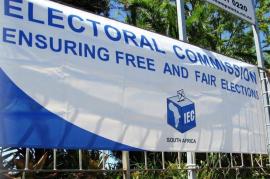Bafana Bafana knocked out of AFCON

Bafana Bafana have bowed out of the Africa Cup of Nations (AFCON) tournament following a defeat by Cameroon.
“Bafana Bafana are out of the Africa Cup of Nations after a defeat by Cameroon at the Al Medina Stadium in Rabat, Morocco, in the Last 16 stage of the tournament on Sunday,” the South African Football Association (SAFA) said on Monday.
Goals from defender Junior Tchamadeu in the 34th minute and Christian Kofane two minutes after the restart in the second half gave Cameroon the advantage before Evidence Makgopa pulled one back for the South African senior men’s national team two minutes from regulation time.
“With a bit of luck, the game could have seen a different outcome had the opportunities that Bafana Bafana created during the match managed to find the back of the net,” said SAFA.
“We are very disappointed and sad that we have been eliminated. I think we had the right plan, and everybody saw that, especially in the first half. We had three good chances in the first half, and the game could have been (over) then,” coach Hugo Broos said.
In a post on social media platform, X, government acknowledged the efforts of the team in Sunday night’s match.
“Bafana Bafana bow out of AFCON after a hard-fought match against Cameroon. We salute the team for their effort and commitment, and thank South Africans for the unwavering support,” said government.
Meanwhile, Bafana Bafana will return to their base in Marrakech on Monday, 5 January 2025 before finally heading back home to South Africa.
The South African senior men’s team were knocked out of AFCON after qualifying for the knockout stages in December 2025. At the time, government congratulated the team for the feat.
READ | Bafana Bafana qualifies for AFCON knockout stages
The final of the tournament is expected to be held on 18 January 2026.
Petrol prices decrease in January 2026
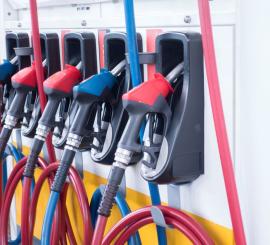
With just several days into the new year, consumers will breathe a sigh of relief as the price of all grades of petrol is set to come down by between 62 and 66 cents this week.
As of Wednesday, 7 January 2026, a litre of Petrol 93 (ULP & LRP) will decrease by 62 cents a litre and Petrol 95 (ULP &LRP) will decrease by 66 cents a litre.
The decrease in price means that a litre of 95, which currently costs R21.41 cents a litre, will now cost R20.75 in Gauteng. In the coast, a litre of 95 will cost R19.92 cents a litre.
The price of Diesel (0.05% sulphur) is set to decrease by R1.37 cents a litre, while the price of Diesel (0.005 % sulphur) will come down by R1.50 cents a litre.
The price of Illuminating Paraffin (wholesale) is set to come down by R1.10 cents a litre and the price of Illuminating Paraffin (wholesale) will fall by R1.48 cents a litre.
The Maximum Retail Price of LPGas will increase by 21 cents per kilogram and 23 cents per kilogram in the Western Cape.
According to the Department of Mineral and Petroleum Resources, the average Brent Crude oil price decreased from 63.55 US Dollars (USD) to 61.47 USD during the period under review.
“The main contributing factor is the oversupply of oil in the market due to increased production by OPEC+ and non-OPEC [Organisation of the Petroleum Exporting Countries] producers,” the department said in a statement on Sunday.
It further added that the average international product prices of Petrol followed the decreasing trend of crude oil.
“The prices of middle distillates, such as diesel and illuminating paraffin, decreased more significantly because of higher inventories for the winter season in the Northern Hemisphere. These factors led to lower contributions to the Basic Fuel Prices of Petrol, Diesel and Illuminating Paraffin by 45.03 c/l, 126.97 c/l and 87.96 c/l, respectively. The prices of Propane and Butane increased during the period under review due to tighter global supply.”
The drop in fuel prices in January 2026 follow fuel price increases in December 2025.
Mayor welcomes re-opening of the Hilton Hotel in Durban

eThekwini Municipality mayor, Cyril Xaba, has welcomed the re-opening of the Hilton Hotel Durban, which will significantly benefit the City’s tourism economy.
Xaba noted that the reopening of the hotel is timely as it comes at the start of Tourism Month, which is celebrated annually in September.
“The hotel’s re-opening will add to the luxury executive accommodation inventory of Durban. The phased re-opening of the hotel will also strategically amplify the city’s business case when bidding to host national and international conferences,” the mayor said.
Apart from enhancing the tourism experience for visitors in the city, Xaba said the re-opening of the hotel will contribute to job creation.
“The Hilton Hotel is also a great added advantage for the Inkosi Albert Luthuli International Convention Centre (Durban ICC), which is situated near the hotel.
“When the Durban ICC conducts their product promotion, it will be characterised by the easy accessibility to prestigious accommodation which further instils business travel confidence.
“The convenient accessibility is also an advantage for dignitaries and high security risk patrons as there is no long-distance travel as all business travel purpose facilities are within easy reach. We are excited that our drive to attract investment in the city, through our Inner-City Regeneration Programme [which] is beginning to yield positive results,” he said.
The Hilton is situated in a prime location of the city’s business tourism meetings, incentives, conferences, and exhibitions precinct.
This is where the Durban ICC and the Durban Exhibition Centre are conveniently housed.
Registration for the Durban Business Fair opens
Meanwhile, the eThekwini Municipality has reminded small, medium and micro enterprises (SMMEs) to register to exhibit at the upcoming South regional Durban Business Fair (DBF).
To revitalise township economies, eThekwini Municipality said the city is reviving the regional Durban Business Fairs, which has been hailed for their important role of showcasing area-based business products, empowering entrepreneurs with skills and availing networking opportunities.
Chairperson of the Economic Development and Planning Committee, Thembo Ntuli said SMMEs are pillars of the city’s economy and drive job creation.
“Unlocking rural and township economic growth remains an integral part of our strategy to promote inclusive economic growth and create more jobs. It is therefore practical to create and coordinate programmes that promote entrepreneurship and small business growth to upscale the revitalisation of rural and township economies,” Ntuli said.
Exhibitor registration for the DBF which will take place from 25 to 27 October 2024, at KwaMnyandu Shopping Centre, is now open.
To book to showcase at this signature business exhibition, register before the deadline of 30 September 2024.
The registration form can be found on the link: https://bit.ly/SouthForm, or email admin@lomes.co.za and request a form.
Alternatively, registration forms can be collected from the security desk at the Embassy Building, 199 Anton Lembede Street.
You can also download the forms from the eThekwini Municipality website: www.durban.gov.za browse under government tab and scroll down to the Durban Business Fair sub-tab.
For more information, the business community can call 031 266 9938.
Shearing shed to take local market to new heights
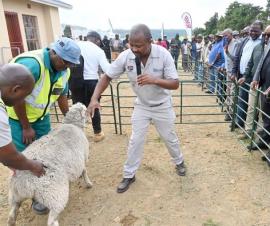
Eastern Cape Premier, Oscar Lubabalo Mabuyane, says the provincial government understands the importance of the agriculture sector in economic development and hence proper infrastructure is being provided to communal farmers.
Mabuyane said this when he handed over a shearing shed to communal wool growers at Jongabantu, in Ngqamakhwe, on Wednesday.
“Agriculture is very important to the economy of our province [and] that is what we preach every day. As the Premier of the province, I am proud and delighted about the good work done by the sheep farmers here, which produce a lot of wealth,” Mabuyane said.
He encouraged sheep farmers to improve the quality of their sheep so that they can sell to the market for meat production.
The shearing shed, which will be owned by the Mbiza Wool Growers Association, was constructed by the provincial Rural Development and Agrarian Reform Department, as part of ongoing programmes to build suitable agricultural infrastructure in rural communities.
All the shearing sheds constructed by the department have a dip plunge (sheep dip tank); fencing; small stock handling facilities; water pump; two PVC tanks and shearing equipment, including a wool presser, sorting table, classing bins, shearing scissors, offices, and ablution facilities.
The Premier said he had heard about the harsh conditions the sheep farmers worked under when they sheared their sheep in garages and roundavels, which affected their wool production.
He said the R1.2 million investment for the shearing shed is aimed at supporting farmers to reach the next level of production.
Since 2019, the provincial government has completed a total of 905 agricultural infrastructure projects, including the fencing of productive lands, stock-water systems, dip tanks, stock handling facilities and sheds.
These projects supported 33 783 smallholder farmers and created 4 946 jobs through their implementation.
“In Ngqamakhwe area alone, the department has completed four shearing sheds worth R4.8 million while another one worth R1.2 million is under construction. Wool production in communal areas, such as Ngqamakhwe, and Dutywa, doubled from two million tons in 2004 to 5.5 million tons in 2021.
“The significance of this growth in monetary terms means incomes have increased from R18 million to more than R250 million in the same period.
“The government is assisting farmers in Ngqamakhwe and across the province though a livestock improvement scheme where farmers are provided with high quality breed livestock,” Mabuyane said.
The provincial government has also provided over 90 Dohne Merino Rams to farmers in Ngqamakhwe and is confident this will improve the quality of wool produced.
“Today’s handover of the shearing shed is the fulfillment of our commitment to ensure rural farmers are beneficiaries of the government programme for the small farmer and a gesture of support.
“It is a catalyst for economic empowerment and a step towards self-sufficiency for our subsistence farmers,” the Premier said.
Mbiza Wool Growers Association Chairperson, Sindisile Cekiso, said the association was formed in 2005 and has 111 members. He thanked officials for their assistance and support.
Amathole District Eastern Cape Communal Wool Growers Association Chairperson, Sikhumbule Nyengule, commended the department for taking care of communal farmers.
“The association is very happy by how government is working and delivering services. We are commercialising our product and we want sheep that are of high breed hence we are working together with government to achieve this goal,” Nyengule said.
Ramadaan Kareem!
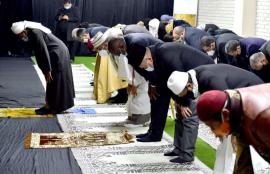
President Cyril Ramaphosa has expressed his well wishes to South African Muslims on the occasion of the holy month of Ramadaan.
The month of prayer, fasting, reflection and community work is expected to end on April 9th.
“Ramadaan is a special period of spiritual devotion, physical sacrifice and charitable outreach for Muslims. But it is also an expression of faith that is embraced with tolerance and Ubuntu by all communities of faith.
“In our 30th year of freedom, the advent of Ramadaan gives us an appreciation of the freedom of religion, belief and opinion enshrined in our Constitution and the richness of our nation’s diversity,” the President said.
He added that the month also “connects the local Muslim community more closely with their brethren around the world at this time” and paid homage to those Muslims going in to month under challenging conditions.
“We remember that for millions of people, Ramadaan is being observed under conditions of conflict, war, displacement and oppression. Our thoughts and prayers go out to the peoples of Palestine, Yemen, Sudan, the eastern Democratic Republic of Congo, Western Sahara, Mali and others – for whom this holy month is a time of great hardship and suffering.
“May the message of Ramadaan, of peace, tolerance and unity serve as an impetus for us as the international fellowship of nations to do all within our means to protect the most vulnerable, and put an end to conflicts and wars everywhere,” President Ramaphosa said.
Petrol price increases
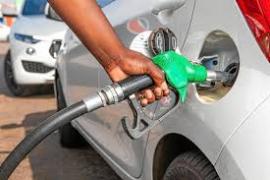
The Department of Mineral Resources and Energy (DMRE) has announced that all grades of fuel will increase by at least R1 from today.
The following are the increases have been announced:
- Petrol (93 ULP & LRP): R1.21 increase.
- Petrol (95 ULP & LRP): R1.21 increase.
- Diesel (0.05% sulphur): R1.05 increase.
- Diesel (0.005% sulphur): R1.18 increase.
- Illuminating paraffin (wholesale): 64 cents increase.
- Single Maximum National Retail Price for illuminating paraffin: 85 cents increase.
- Maximum LP Gas retail price: 41 cents increase
The increases mean that a litre of 95, which used to cost R23.24 in Gauteng, now costs R24.45 a litre.
The DMRE said a number of factors influenced the increases, including:
- The average Brent Crude oil price increased from 82.03 US Dollars (USD) to 82.50 USD during the period under review.
- The average international product prices of petrol, diesel and illuminating paraffin increased in line with the higher crude oil prices.
- The Rand depreciated slightly on average, against the US Dollar from 18.77 to 19.20 Rand per USD during the period under review. This led to higher contributions to the Basic Fuel Prices of petrol, diesel and illuminating paraffin.
- The DMRE Minister, Gwede Mantashe with the concurrence Minister of Finance, Enoch Godongwana approved an increase from 0.1 c/l to 1.0 c/l in the IP Tracer Dye Levy that is applicable to Diesel with effect from the 6 March 2024. This increase is temporary until the 5th of March 2025.
“South Africa’s fuel prices are adjusted monthly, informed by international and local factors. International factors include the fact that South Africa imports both crude oil and finished products at a price set at the international level, including importation costs,” the department explained.
Plans in place to create 390 973 EPWP work opportunities
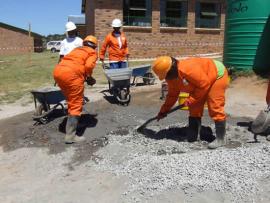
As this year marks the 20th anniversary of the Expanded Public Works Programme (EPWP), Cabinet says plans are in place to achieve the remaining 390 973 work opportunities by March 2024.
The year 2024 marks 20 years of the existence of the EPWP, which represents one of South Africa’s success stories of mass public employment programmes and is by far one of the largest poverty alleviation initiatives.
Briefing media on Thursday during a post Cabinet briefing, Minister in the Presidency Khumbudzo Ntshavheni said Cabinet received a briefing on the implementation and achievements of the EPWP, a flagship government programme that has provided millions of work opportunities to unemployed South Africans since its inception.
“Cabinet was informed that 4 609 000 work opportunities were created during the Phase 4 medium-term of the EPWP, which covers the period 2019/2020 – 2022/23.
“This figure represents a 92% achievement against the target set by the Sixth Administration to create five million work opportunities. Plans are in place to achieve the remaining 390 973 work opportunities by March 2024,” the Minister said.
The EPWP has over the past 20 years created over 14 million work opportunities, making it the largest continuous public employment programme in the world.
This milestone was achieved through ongoing partnerships with the private sector and civil society.
“These work opportunities have contributed to skills development for the participants, as they were created under a range of EPWP projects in the tourism, agriculture, infrastructure, social projects and projects led by women,” Ntshavheni said.
Of the 4 609 000 work opportunities, the top three provinces where most work opportunities have been created are KwaZulu-Natal, which accounts for 1 064 000 opportunities (23%), followed by the Eastern Cape, with 903 789 (20%) and the Western Cape at 508 954 (11%).
The Minister said while most of these opportunities are short- to medium-term; some have resulted in permanent employment. Figures also indicate that more than 20% of participants obtained employment outside the EPWP.
Many past EPWP participants have successfully completed diplomas in fields such as professional cookery and some are permanently employed in the hospitality industry. In addition to work opportunities, the EPWP also contributes much more in terms of service delivery, and improvements of amenities in communities and a better quality of life.
Over R52 billion has been transferred to the EPWP participants as wages for work done in Phase 4. In addition, over 600 businesses were established through the programme.
How to: Easy steps to register to vote online
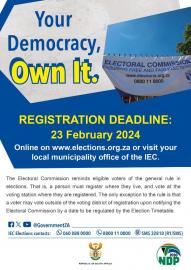
With just a few hours to go before the voter’s roll closes, the Electoral Commission has made it easier than ever to register to vote using their website.
The online voter registration portal, registertovote.elections.org.za, is functional and has proven to be the most effective method, allowing everyone to update their details from the comfort of their own homes, work places and communities ahead of the 2024 National and Provincial Elections.
Voters can use this portal to register to vote, view or update their current voter address, find their voting station, request a special vote, or simply browse for important information such as upcoming election dates in their ward.
You can register to vote by following these easy steps:
- Get your SA ID card/book ready and go to the link registertovote.elections.org.za.
- Enter your personal information: ID number, name and surname, and mobile number. The Chief Electoral Officer must compile and maintain a national common voters’ roll. The personal information required is for purposes of achieving this legal requirement and will not be used for any other purpose as required by the Protection of Personal Information Act, No. 4 of 2013.
- A one-time pin (OTP) will be sent to your cellphone number. Insert the pin and click on “confirm pin”.
- Capture your home address. You can type your address and select from the list or enter your address and click the search button.
- Review and acknowledge your information in the voter registration summary. This page will also tell you your ward and voting district.
- Tick the declaration box and then click on ID verification.
- Take a photo or upload a scan of your SA ID and click on continue.
- Your voter registration application has been submitted successfully. The IEC will verify the application and will notify you once it has been processed. You will receive an sms notification.
To submit an application to register to vote, you must meet the following requirements:
- be a South Africa citizen;
- be at least 16 years (you can only vote from age 18).
What you need to upload when using online voter registration:
- green barcoded ID book
- smart ID card,
- temporary ID certificate (TIC)
You are only registered to vote once you have received a receipt via SMS or email, or have confirmed that you are registered.
Voter registration for the 2024 General Elections will close at midnight, which is the day of proclamation of the General Election 2024.
The President and the Provincial Premiers will proclaim Election Day, 29 May 2024, during the course of today.
Citizens have until midnight to use the platform for voter registration and update their particulars. Citizens out of country can also use the same voter registration platform until midnight.
Citizens may also visit IEC offices in the all municipalities to register to vote. The offices will remain operational until 16:00.
Voters can also reach out to the Chat-bot on the 0600 88 00 00 WhatsApp line or call 0800118000.
IEC welcomes announcement of 2024 Election Date
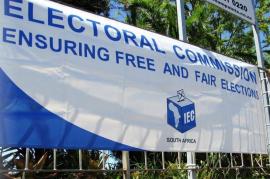
The Electoral Commission of South Africa (IEC) has welcomed the announcement by President Cyril Ramaphosa setting the 2024 National and Provincial Elections date for 29 May.
The President has, in line with section 17(2) of the Electoral act 73 of 1998, consulted with the IEC on the election date.
“This pronouncement of the Election Date provides an unambiguous motivation for the Commission to pull out all the stops in the intensification of preparations for Election Day. The Electoral Commission reiterates its commitment and readiness to ensure a successful 2024 general elections,” the Commission said in a statement.
Furthermore, the President convened a meeting with all nine provincial Premiers and the IEC to discuss the state of readiness for the General Elections.
“It creates certainty for us. It creates certainty for those who want to participate as contestants, be they on party lists or as independent candidates,” said IEC Deputy CEO, Masego Shiburi.
Shiburi said the President announced the date in consultation with the Commission, as that is the statute requirement.
“With each election, the number of competing parties increase. For these elections, we will also have independent candidates and their numbers are still indeterminate because candidate nomination is yet to open.
“Once we finalise candidate nomination, we will be able to print ballots and make them available in our missions to those who will be voting abroad but mostly importantly, to those who will be voting in the country,” Shiburi said.
The announcement of the Election Date comes after the successful voter registration campaign, which included two general registration weekends, an overseas voter registration drive, campus activations and registration within Correctional Services centres.
The 2024 Elections coincide with South Africa’s celebration of 30 years of freedom and democracy.
President Ramaphosa has called on all eligible voters to fully participate in this important and historic milestone of the democratic calendar.
“Beyond the fulfilment of our constitutional obligation, these upcoming elections are also a celebration of our democratic journey and a determination of the future that we all desire.
“I call on all South Africans to exercise their democratic right to vote and for those who will be campaigning to do so peacefully, within the full observance of the law. We also urge unregistered voters to use the online registration platform to register,” President Ramaphosa said.
According to the IEC, more than 27 million South Africans are registered to vote and 14 million others remain unregistered but are eligible to do so.
The Electoral Commission has reminded South Africans that while the Election Date has been set and announced, eligible voters have until Friday, 23 February 2024 to register. The latter date is the anticipated day of the proclamation of the Election Date.
Unregistered voters and those who need to update their address details can visit their local municipality office, the Electoral Commission or go to the online voter registration portal, registertovote.elections.org.za or reach the chat bot on 0600 88 00 00 WhatsApp line.
Election Timetable
Following the proclamation of the Election Date, the Electoral Commission will publish the Election Timetable in the Government Gazette after consultation with the National Party Liaison Committee.
The Election Timetable will outline the various cut-off dates for the performance of certain electoral activities. The timetable will include the following:
– Certification of the voters’ roll.
– Publication of details of voting stations.
– Submission of candidates nomination.
– Submission of notice to vote outside of the country.
– Applications for special votes .
Meanwhile, the Commission has reminded eligible voters of the general rule in elections. That is, a person must register where they live and vote at the voting station where they are registered.
“The only exception to the rule is that a voter may vote outside of the voting district of registration upon notifying the Electoral Commission by a date to be regulated by the Election Timetable,” the Commission said.
R22 million for KZN spaza shops and general dealers
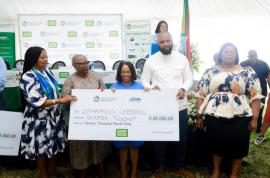
A total of R22 million has been allocated to support South African spaza shop owners, supermarkets, and general dealers in KwaZulu-Natal.
The Zimele Traders Fund by the Ithala Development Finance Corporation was announced by Economic Development, Tourism and Environmental Affairs MEC, Siboniso Duma, on Tuesday.
Duma said spaza shop owners, including supermarkets and general dealers in the province, who are strictly South Africans can apply for a grant in the form of trading stock to the value of R20 000.
“A total of R10 million has been set aside for this purpose. We are targeting 500 spaza shops across the province,” Duma said.
This follows an announcement made towards the end of last year, where the MEC revealed the department’s intention to embark on an entrepreneurship revolution, focusing on spaza shops located in rural areas and the townships.
Ithala SOC limited and Ithala Development Finance Corporation (IDFC), which are the department entities, are deepening support for entrepreneurs in the informal economy.
Spaza shop owners have long complained about being forced out of the market because they lack the buying power, while their competitors, who are mostly foreigners, buy in bulk which makes them have a competitive edge.
The MEC said the department has reconfigured the bulk buying warehouse at KwaSithebe in Mandeni, with a cost of more than R15 million.
“We have added a call centre and the online ordering system. The first bulk purchase stock for spaza shops, supermarkets and general dealers is valued at R10 million.
“In addition, we have made available 17 trucks to move the stock across the province. This is to create direct access stock, reduce costs of goods and further make them accessible within local municipalities,” Duma said.
As a permanent arrangement, the department is identifying buildings that are owned by Ithala across the province to be used as warehouses.
The MEC called on eligible spaza shop owners, supermarkets, and general dealers to submit their applications for the grant.
The applications opened on Tuesday, 20 February, and will close on 16 March 2024.
“Successful applications will be announced on 15 April 2024. Applications will run indefinitely,” he said.
Duma also announced that through the Zimele Fund, a total of about R11.9 million has been set aside for a soft loan of up to R100 000 at 2% interest for a co-operative and 4% fixed interest for a Close Corporation/ Pty.
For a quotation request, shop owners are requested to use the WhatsApp number 072 521 0897 or 031 319 5500 for enquiries.
Emails can be send to zimeletradersfund@kznedtea.gov.za/ Website: http://www.kznbulk-buying.co.za.









